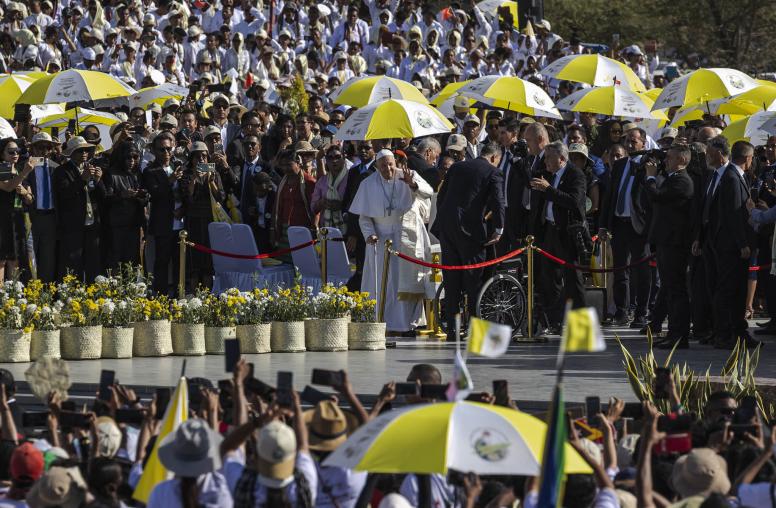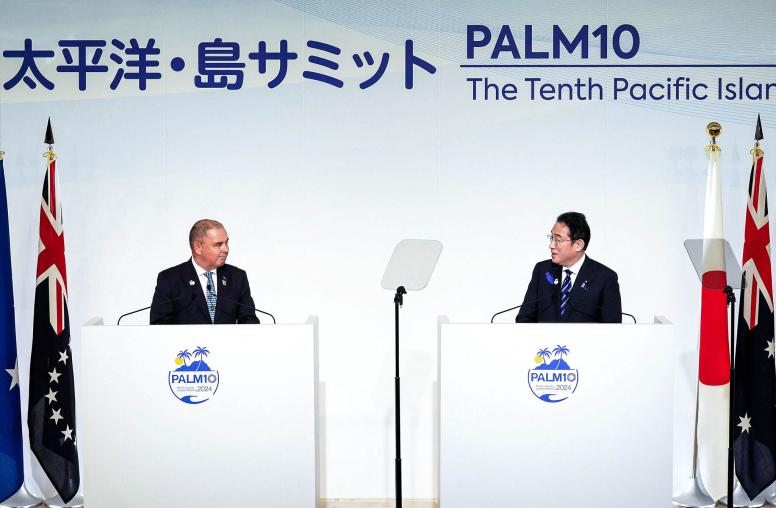Riots in Papua New Guinea Are a Warning: Urgent Change is Needed
PNG’s violence shows U.S. and international partners must re-focus on roots of poor governance.
Riots erupted in Papua New Guinea's capital yesterday, laying bare the hollowness of governance that is failing to meet public needs, thus risking deeper violence and instability. U.S attention to the Pacific Islands' largest and most populous nation is increasing, partly because it is an arena for geopolitical competition with China. While Papua New Guinea's leaders are good at rolling out the red carpet for visiting partners, the state fails lamentably in providing basic services for its people. This week’s violence is a wake-up call for U.S and international policymakers to re-focus on this root of the country’s instability.

Papua New Guinea: Two Worlds
The riots erupted as a result of what Prime Minister James Marape explained away as a “technical glitch” in the government’s payroll system. Public servants were docked the equivalent of roughly $100 in their fortnightly paychecks, about half of the take-home salary for some. In the capital, Port Moresby, the police went on strike. Initially peaceful protests spun into mass looting and arson. By nightfall, officials called in the army. The violence spread to other urban centers today and at least 15 people have died so far.
The violence reveals an obvious truth, one particularly inconvenient for outsiders engaging in the country. Papua New Guinea (PNG) is effectively two worlds. International partners and donors engage a reed-thin pretense of officialdom — an English-speaking, rather officious governmental world where every decision seems to require an archly formal document such as a memorandum of understanding, a Cabinet decision or a long-winded plan. This world is not easy to engage with but makes itself at least somewhat legible to outsiders.
But the bulk of PNG’s estimated 10 million people live in a separate, vast, uncertain world of unemployment and at best meager income. Especially amid the capital city’s high costs, people live precariously, desperate and with little to lose. Most foreign visitors see this world only through the locked windows of the high-security vehicles that ferry them around a city they find too dangerous to walk the streets. It is this world that is important for anyone reckoning with PNG to understand.
The World Comes Calling
Papua New Guinea has garnered global attention in recent years, spurred partly by increased major-power competition in the Pacific. The United States last year sent its secretaries of state and defense, and the head of its Agency for International Development (USAID) to visit Port Moresby. It opened a new embassy building, upgraded its USAID presence and inked a bilateral Defense Cooperation Agreement.
In 2022, the United States designated PNG as one of five countries or regions in which to launch its Strategy to Prevent Conflict and Promote Stability — an initiative created by the 2019 Global Fragility Act. While some among PNG’s political elite and thought leaders voice consternation at a characterization of their nation as “fragile,” the grainy video of Port Moresby’s violence might seem to some like a visual definition of “fragility.”
In a country that prizes hospitality and honoring guests, PNG’s leaders put up a good show for visiting officials. This can belie minimal substance behind it all. Donor-supported development and improvement projects, devised supposedly in partnership with PNG, rely for implementation on a state bureaucracy corroded by employees’ poor pay, an enervating workplace culture and corruption. On a USIP team’s visit last year to the central node of the government’s bureaucracy, less than a handful of people could be found in the vast building.
One example of the result: A basic development project — backed by the United States, Australia, New Zealand and Japan — is to help PNG extend power grid access to more than the current 10% to 15% of people. This effort, also an element of balancing China’s engagements in the country, is stalled because it relies on partnership with the country’s state-owned electrical company, which analysts find suffers “chronic crisis” and “general dysfunction.” While some public servants do heroic work and contracted advisers help to fill gaps behind the scenes, broad systems of governance remain hapless and lethargic.
PNG’s security sector, which Papua New Guineans refer to as the “disciplined forces,” appeared not particularly disciplined yesterday. Police who have been extensively and expensively trained by Australia didn’t seem to do much to stem the bedlam; indeed, their sudden strike precipitated it. Most officers melted away, others stormed the parliament demanding redress. International partners who are now planning training or assistance programs must use yesterday’s breakdown to better understand the root causes — and shape, with reliable PNG partners, including civil society, changes to international security assistance. These international partners include Australia, which last month agreed with PNG on a project to provide foreign advisers in supervisory police ranks. And they include the United States, for which security sector support is part of its Strategy to Prevent Conflict and Promote Stability. Simply offering more of the same training and advisers isn’t going to cut it. Increasing police salaries might help.
How to Fill the Governance Gap?
Both data and daily experience in PNG pinpoint a key reason for the deep disconnect that is laid bare by this week’s rioting: Corruption is endemic. The research group Transparency International found 96% of PNG citizens identifying government corruption as a big problem, and 54% admitting to having paid a bribe for a public service in the previous 12 months — both measures among the worst in the Pacific Islands region.
Even within, and certainly beyond, urban areas, state systems to provide health, education or other basic services are either frayed or absent from most citizens’ lives. People cope by seeking support from family, clan members and connections. Unpaid and unsung heroes — people whom writers Melissa Demian and Zuabe Tinning have termed “efficacious personalities” — help kin and neighbors surmount everyday challenges amid these broken systems. This Band-Aid approach often works, yet it also papers over the absence of a functioning state.
And this state (like many of its citizens) is stone broke. In recent years, Australia reversed a policy of not providing budget support, and now has provided more than a billion dollars since 2019. In 2023, PNG entered into a program with the International Monetary Fund to try to right the economic ship.
In a thoughtful and sobering speech last year, the assistant governor of the Bank of Papua New Guinea, Jeffrey Yabon, warned starkly of economic pain as part of these reforms in a place where many can barely afford the cost of living now. The country's National Research Institute in 2016 found a typical rental property can cost up to 120% of household income. The minimum wage is $1 per hour. Statistics from the Asia Development Bank have 37.5% of the population living below the poverty line.
Some human stories behind these statistics derive from the connections I keep with friends and colleagues in Port Moresby. While anecdotes are not comprehensive data, they form a pattern that draws an immiserated picture. They are stories of indebtedness, of having to bribe people to get on government payrolls, of the hunger that comes from lacking money to buy food, of perceiving that politicians and people with good jobs in the state structures are there to fill their pockets, of young family members committing suicide in the absence of hope. Amid such gnawing precarity, even a small cut in take-home pay for the small cohort that is employed is a lit match thrown into a gas tank. The past two days’ violence included obvious opportunism — men loading their vehicles with washing machines from ransacked stores don’t seem to meet the definition of the urban poor — but hopelessness and precarity ignited the chaos.
This is not the first time that PNG’s capital has been wracked by this sort of roiling unrest, sometimes over unpaid wages, although the deaths and destruction seem greater than before. Nor is it the first time that commentators have pointed out that PNG’s woes are evidence of broken systems. It also comes at a politically precarious moment. Prime Minister Marape’s grace period — in which the parliamentary opposition cannot try to oust him — is coming to an end. A handful of members of his coalition have deserted him and competitors are circling, although it’s by no means certain that they have anything radical in their pockets to address the root causes of frustration.
If anything good is to come from this new trauma, those who are trying to engage Papua New Guinea must ask hard questions about their approach — including the capacities and intentions of those that make up the state, and figuring out ways by which that vast “second world” can benefit more from PNG’s newfound place in the sun.



